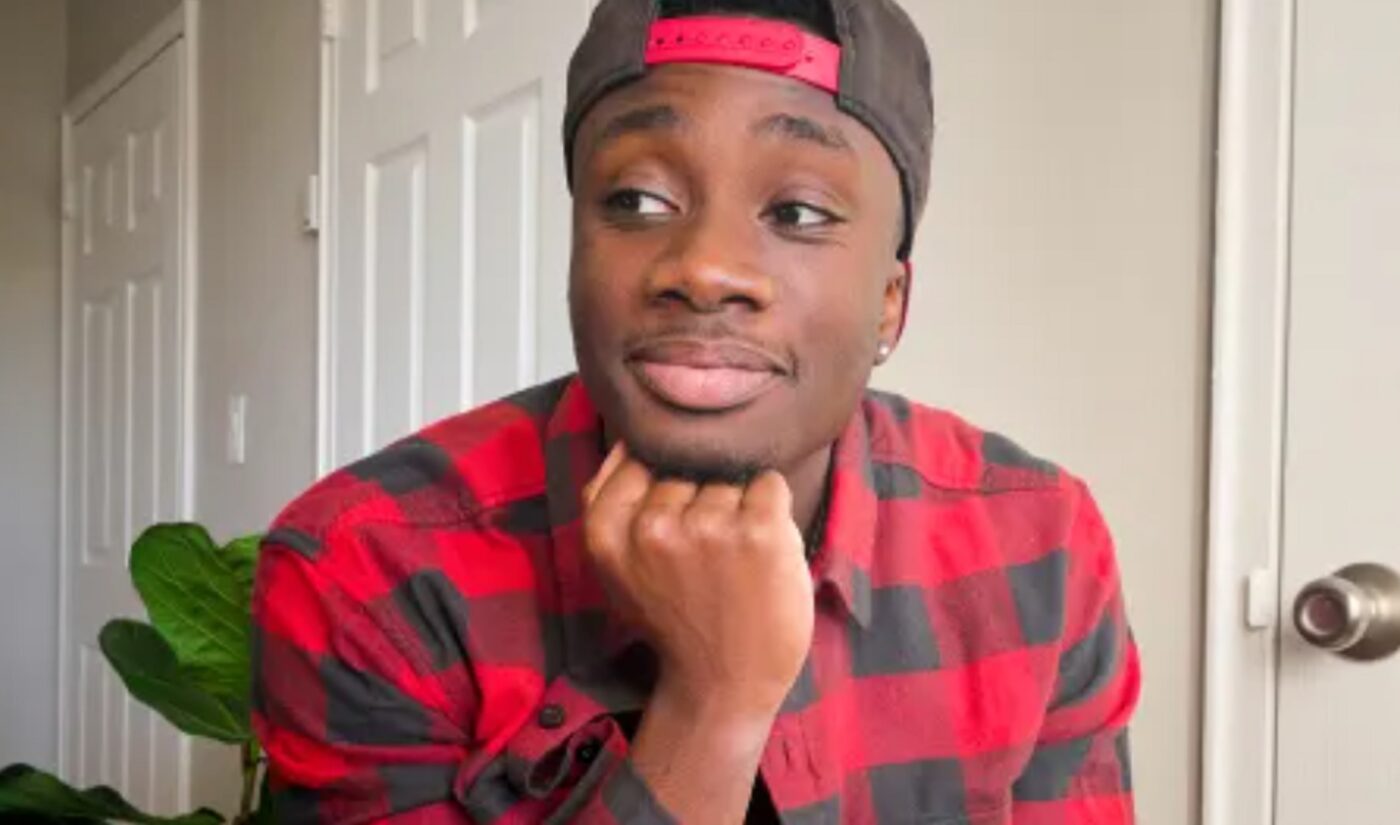Welcome to Millionaires, where we profile creators who have recently crossed the one million follower mark on platforms like YouTube, TikTok, and Twitch. There are creators crossing this threshold every week, and each of them has a story to tell about their success. Read previous installments here.
If Mamadou Ndiaye ever got to meet an elephant, he’s pretty sure it would be his equivalent of a celebrity encounter.
Ndiaye, who’s 26, has loved all animals for as long as he can remember, but there’s just something special about elephants.

Subscribe for daily Tubefilter Top Stories
And if you tune in to his TikTok content, you can see him light up when he talks about them.
Like many other creators we’ve spoken to over the last four years, Ndiaye had no plans to become a full-time content creator. He grew up on Zoobooks and National Geographic Kids, and when he was old enough to pick a career path, knew he wanted to do something in science. He ended up going to college for environmental science–which, as he explains, is not exactly what everyone expects.
“[I]t usually surprises people because it doesn’t really have a whole lot to do with animals,” he says. “We did a lot of surveys of land that was either going to be redeveloped or was getting knocked down. At one point, I was assisting in asbestos removals as a project manager. You’re not really in the field interacting with wildlife the way people expected somebody like me to be doing. That was my original career path.”
Then COVID hit, and TikTok started getting popular. Ndiaye admits he was “harsh” on the app at first, but on April 15, 2020, he finally gave in and downloaded it, deciding to see what all the fuss was about.
The very next day, he was laid off.
So, with his new free time, Ndiaye started posting TikTok videos. Just random one-offs with no particular theme…including a video about “animals that are way bigger than you think.” That video did really well, Ndiaye says.
“I did the typical TikTok thing where something worked for me, so I decided to just run it into the dirt,” he laughs. “At one point, I even said, ‘I’m just going to keep doing this until it flops.'” But it didn’t flop. Ndiaye’s account grew to thousands, and then millions of followers. “I realized that this could really be my niche in a rapidly growing platform at the time,” he says.
Now, four years later, Ndiaye is a full-time content creator who’s rapidly approaching 20 million followers. He’s already released his first book, 100 Animals That Can F*cking End You, and has plans to explore long-form YouTube content and maybe a podcast sometime in the near future.
He also really, really wants to meet an elephant. Just putting that out there.
Check out our chat with him below.
@mndiaye_97I should probably explain that last part lol♬ Watching The Clouds – LAKEY INSPIRED
This interview has been edited for length and clarity.
Tubefilter: Hello! Very nice to meet you. I’ve seen quite a few of your videos over the years, but to start this, imagine somebody is reading and they don’t know you, they haven’t seen your stuff. Give me a little bit of background information about you, where you’re from, and what your life was like before social media.
Mamadou Ndiaye: I’m Mamadou Ndiaye. I guess the best way to describe what I do, I’m an internet zoologist. I talk about animals online, and I turn that into content. In that intersection, I guess you can call it edutainment. In terms of me, I’m from New Jersey, grew up in Jersey City. I was always interested in animals as a kid. People always ask me, where did that interest come from, and I always answer, I used to get those zoo books as a kid. I remember those old commercials they had. I had every single issue to the point where they started sending me duplicates. I got the National Geographics for kids. I always watched Animal Planet, the Discovery Channel. I was always consuming that content.
Truthfully, it was more of a chicken-and-the-egg kind of thing where I was doing all those things because I had the interest in animals. That was already intrinsic. I really don’t know where that interest came from. As young as three, four years old, I was making these little animal books. They weren’t really even books. They were just drawings of animals and me stapling them together and showing it to my mom, like, “Hey, I wrote a book.”
I was always interested in animals and the natural world. I stumbled into TikTok by accident and found that there’s actually a pretty big audience for that kind of thing. I’ve been able to hone in my passion for nature as well as just– I like making people laugh. I wouldn’t say I aspired to be an entertainer, but that was always something in the back of my head. This was a nice marriage between the two.
Tubefilter: Did you have a career path into zoology?
Mamadou Ndiaye: I didn’t, actually. I went to Rutgers University. I graduated in 2019, and I majored in environmental science.
Tubefilter: Oh, that aligns.
Mamadou Ndiaye: To some extent, but it usually surprises people because it doesn’t really have a whole lot to do with animals. We did a lot of surveys of land that was either going to be redeveloped or was getting knocked down. At one point, I was assisting in asbestos removals as a project manager. You’re not really in the field interacting with wildlife the way people expected somebody like me to be doing. That was my original career path.
Tubefilter: That was in 2019, so how did you do with work once COVID hit? Was that part of the reason you went to TikTok?
Mamadou Ndiaye: Yes. I always bring this up every time people ask, because the dates are always funny to me. I downloaded TikTok as a joke. I was harsh on TikTok at first. I was a big critic. I downloaded it as a joke, April 15, 2020, and actually got laid off April 16, the very next day.
Tubefilter: Oh, no.
Mamadou Ndiaye: No, the company was actually great. I had only been working there two to three months. I was still pretty much in the learning phase. Once the virus hit, a lot of our work was based outside in New York, and that became the center for the virus.
Tubefilter: What were you doing then?
Mamadou Ndiaye: Around that time, that’s when I was doing more asbestos removals as a project manager, but since I was also in the training phase, when I would do these surveys. Basically you have to gather a whole bunch of materials on either an abandoned building or whatever site that somebody’s looking to develop on. I was still in the training phase, so essentially, they would have to pay two people to go to one site. I knew that this isn’t really sustainable, so I knew my days were numbered there. They actually let me on a lot longer than they really needed to, so I was appreciative of that.
Once the pandemic hit, I was laid off. I was home. I was bored. I was unemployed. I didn’t really have anything better to do. There was this shiny new app that everybody was talking about, so I got on there. Just one thing led to another, and I started creating content.
Tubefilter: How did you find the zoology niche?
Mamadou Ndiaye: That’s funny. It happened completely by accident. It was supposed to be a one-off video. The first video I made that was animal-related, I think it was “animals that are way bigger than you think” because there was a video of a moose walking next to a car, and everybody was freaking out over just how big these massive deer are. I thought that’d be something that’d be funny. Again, I thought it was just going to be a one-off thing, but the video did really well.
I did the typical TikTok thing where something worked for me, so I decided to just run it into the dirt. At one point, I even said, “I’m just going to keep doing this until it flops.” It didn’t really flop. It escalated from there. I realized that this could really be my niche in a rapidly growing platform at the time. Yes, I stuck with it. I had a lot of time to hone in that aspect because again I was unemployed. That’s how I got involved in zoology. I was making content for maybe two months before that. Originally, my stuff had nothing to do with animals. If you scroll back far enough, it’s surprising to people that that’s how I started originally.
Tubefilter: It’s very cool that your interest that you’ve had since you were a kid was able to parlay into this new career for you. Very cool.
Mamadou Ndiaye: Yes, definitely.
Tubefilter: I have seen that video of yours. I lived up north for a while and did see moose in the wild. I remember seeing that video, though, of yours, and being still surprised by how big they can be. There’s something about seeing them next to a car that’s like, something’s not right there. [laughs]
Mamadou Ndiaye: Yes. Because moose, you think of deer, and you just think, “Okay, it’s a large deer.” Then you see them in person, and you’re like, “This deer is closer to an elephant.” That’s not really right.
Tubefilter: That’s not right! Yes. There’s something wrong there. You had this video, you downloaded TikTok as a joke, and then you did this video, a one-off, and then everything is falling into place for you. Did you hit a moment where you were like, “Okay, I’m going to keep doing this”? I know you said you wanted to ride it into the ground as long as you could, but when did you commit to this as a real thing for you moving forward?
Mamadou Ndiaye: I can’t really say when that moment was, because I never really had an end goal. I was just, in my mind, posting to the void and letting it find the people that were interested in it. I will say there was one video, it was about extinct animals. I think the title was…what was it? “Prehistoric Animals that Make Me Question God.” I was getting really creative with some of the titles. It was basically talking about the wild extinct animals that aren’t around anymore, like titanoboa, the 40-foot snake that really freaked people out, things like that. That video did really well. It went pretty viral.
I don’t know if that was the moment, but that told me, “Okay, there’s something here, and I have the resources and the time to see where this goes.” That’s the mindset that I was at. I wasn’t really working towards a certain goal, but I was just trying to be consistent and see just what could happen. I just did that for a little over a year. I think I joined TikTok at the perfect time. A lot of things happened the way that they did for me to blow up. Yes, that video was probably the turning point.
Tubefilter: What is your current production process in terms of, how do you get ideas for videos, and then how long does it take you to build a video from start to finish?
Mamadou Ndiaye: On the TikTok front, I make content in bulk. I’ll tend to have one day where I sit down and just think of either ideas that I’ve been mulling over over the past week and trying to see how I can parlay that into about a minute, a minute and a half video on TikTok, or it could be reactionary where I take a video that people have had a really strong reaction to, something that’s been going viral, if I feel I can explain it well and be entertaining while doing it. I’ll have these little working titles in a notebook, and then I’ll just add up all those titles. I try to pick maybe four or five of them. I’ll just take one day to just write a whole bunch of scripts.
I record the next day. Usually, about maybe three, four days of work gives me about, I’d say, two weeks’ worth of TikToks to post.
YouTube, it takes a little bit longer. One video might take anywhere from about a week of preparation from when I had the idea to sometimes 10 days, two weeks. Yes, different processes, depending on the platform, but for the most part, pretty similar.
Tubefilter: Got you. You mentioned doing sometimes you’ll pull viral videos and react to them. I noticed that you’ve done a few collaborations with Lindsay Nikole. I interviewed her for one of our creator columns as well. It is very interesting to see this little community of zoologists is really growing and really doing well across all platforms.
Mamadou Ndiaye: Yes, I think that’s one of the great things about TikTok, it allows you to find people in your community that you otherwise wouldn’t have really had access to. Lindsay is great. She’s a zoologist. She graduated from the University of Oregon, I believe. We actually connected through TikTok, through some of her fans commenting on my videos saying that our content is pretty similar, we should do a collab. That’s literally how I got in touch with her. Now, I consider her one of my closest friends on the platform. I think that’s a huge thing with TikTok and why it’s been as successful as it’s been.
Tubefilter: Yes, agreed. There’s a certain element of– How do I describe it? Companionship between creators there that’s different. I think it’s the ability to stitch and respond to people. Dueting with people really played a big part in that. Do you have plans to go back to environmental science, or is this your full-time plan for the future? You’re approaching 20 million followers, which is quite a number. What are your future plans?
Mamadou Ndiaye: Honestly, everything happened so fast that I didn’t really have time to sit down and map out what I expected my career trajectory to be in a couple of years. Honestly, I’m at the point where I’m just trying to grow all my platforms, not just TikTok but also Instagram and YouTube and probably move on to Facebook and use that as a springboard for other opportunities.
I’ve already been able to have a book out, which is something I never thought was going to be possible. It’s a nice full-circle moment, considering the little books that I would make as a kid. There was that. There’s just all the connections that I’ve been able to make so far, all the people I’ve been able to reach. I like to think that I’m becoming the type of person I would have wanted to have access to as a kid. Just trying to grow the social medias. That’s the goal now. I guess you could say I’m winging it at this point.
Tubefilter: Have you thought about doing any kind of classroom visitations or stage shows or anything to connect more with a younger audience for edutainment?
Mamadou Ndiaye: Yes, definitely. I feel like that would be the natural progression in what I’m doing. Because obviously, I feel like I am making an impact. There is only so much you can really do from in front of a green screen, because all of my videos are recorded from the comfort of my room. Being able to go out there and actually convey this to people…I think the endgame that would really be good is if I was able to do exactly what I’m doing, but actually be in the environment, whether it’s in terms of captivity or a sanctuary, or actually be out there in the field, observing the things that I’m talking about.
It would be nice to eventually move toward that. Being able to just go and just talk to people face to face and have that interaction, that’s definitely something that I would like to get started in the future.
Tubefilter: Are you working on another book?
Mamadou Ndiaye: Not right now, but that’s definitely something that’s on my mind, considering how successful and how the process of writing the first one was. It was nowhere near as intensive as I thought. I had a lot of help with it. I had a really great team behind me.
Tubefilter: How did the first book come about? Did a publisher approach you?
Mamadou Ndiaye: Yes, they reached out through my management. They basically outlined the entire scope of everything, what they would need for me, what would be required, what the timeline would look like. Obviously, I have no idea anything about the industry, what goes into writing a book. The way they outlined everything, it seemed pretty manageable. I didn’t really have to go too far outside of my schedule.
Honestly, it was almost easier than making the videos, because on TikTok, it’s obviously short-form content. With this book, I feel like I was able to really go down the rabbit hole as deep as I really wanted. I could just have my little spiel. You could tell what animals I favored by how many pages they got. Some animals got one page, some got three to four. To be able to have that, in some ways, writing the book was easier. No, they really made the process as simple as writing a book can be. Obviously, it was work, and it did take a lot of effort, but they facilitated a lot in that process.
Tubefilter: Good. I’m glad. Yes, it’s definitely an intimidating prospect for you to be like, “Hey, start from zero and build us a book.” I wanted to ask a little bit about, so you’ve grown on short-form, you focused on short-form, but you’re also doing some long-form on YouTube. I’m curious about how you feel about long-form and where you see that fitting into your overall trajectory.
Mamadou Ndiaye: I feel like we’re at a point now where both long-form and short-form have a place in terms of media, in terms of edutainment. I was always wary of long-form, mainly YouTube, because, at the time, I felt like TikTok was this flash-in-the-pan kind of thing and that I joined at really the ideal, opportune time. Where something as long-standing as YouTube, I didn’t know if I could excel on a platform like that, honestly. Long-form content definitely has its merits, as does short-form. Being able to study both and understand what works and I guess how to really make the most out of both because, yes, once you have that combination, then you can really do a lot with your platform.
Tubefilter: When you’re working on a video, in terms of research, how does the research process look for you?
Mamadou Ndiaye: As I’ve been making more and more videos, that has changed. In the past, a lot of these were just videos where I had heavy background knowledge. Obviously, I still fact-check myself on stuff, because you can’t assume you’re just ineffable. You can’t make mistakes. These days now, I dedicate blocks to researching just because even if you think you know everything, even if you do know everything, there might be something else that you can add on that you would’ve regretted not having in the first place.
I’ll have maybe two or three days to research, just try to consume as much relevant content as I can. Even something that might be a little bit on the fringes, because you could always tie it back. There’s always that. You also want to cross-check with multiple sources, because obviously in the science field, you’re constantly learning, relearning and unlearning things, so you just want to try to stay up-to-date as much as possible.
You do have to be careful with the way you research. It’s really easy to accidentally spread misinformation. I actually even have a video recently on YouTube covering all the facts that I either got wrong, or misconceptions that I have stated or put on my platform in the past.
Trying to be just responsible with the information you’re putting out and be transparent when you do make a mistake, because, in the scientific community, it’s impossible to have a 100% record. Definitely allotting a lot more time towards your research. Also, it’s fun. You learn things by accident all the time.
Tubefilter: It takes a lot of guts to do a video like you did where you’re like, “Here’s the things I did wrong.”
Mamadou Ndiaye: I do appreciate you saying that it’s big of me, but honestly, I really do think when you’re transparent with your audience, it actually makes it easier for them to believe you seeing that you’re capable of admitting when you’re wrong as opposed to somebody that just appears to have a spotless record all the time. I feel like you really build that trust with your community that way. I feel like it’s not too hard to admit when you’re wrong.
Tubefilter: What has been your favorite part of this whole being online journey?
Mamadou Ndiaye: My favorite part is definitely both finding your community, but also being able to reach people outside of it. I like to think there’s this nice intersection that I’m doing where my content’s appealing to the old-school animal nerds like me who can sit down and consume a documentary for two to three hours, but also people who might not have that background interest, but because of the way I’m describing things and just the jokes that I’m making and things of that nature, they somehow find a vested interest in that.
Being able to bridge those two groups together and create just one big overarching community, that’s been really rewarding, knowing that there’s a lot of people that have the same interest that I did, which I didn’t really believe as a kid. It just goes back to just being that figure that I would’ve wanted as a kid. Especially being a person of color, as growing up, you didn’t see a lot of people in this industry that you could really look up to, and that is important in terms of representation. Those are pretty big to me.
Tubefilter: Huge. Very important. Okay, to wrap up, what’s your favorite animal?
Mamadou Ndiaye: Elephants. Easy.
Tubefilter: Why?
Mamadou Ndiaye: In my unbiased opinion– No, it’s very biased. [laughs] I don’t know, I just think they’re the perfect animal. I always think of it like, if somebody never saw an elephant before, how would you even go about describing something like that? Something that’s the biggest land mammal on Earth. They’re, what? Up to 11, 12 feet tall at the shoulders, huge ears. They have a tentacle coming out of their face that can lift 700 pounds.
Then on top of that, they’re incredibly emotional beings, highly intelligent. I’ll die on this hill: I think they’re the smartest non-human creatures out there above apes and octopi.
Just, the fact that they exhibit emotions that we previously thought were just in humans… Obviously, a lot of people have seen elephants are capable of mourning the dead. They’ll pass the bones of past matriarchs or members of their herd, and they’ll have a funeral procession or a vigil. They’ve done that with non-elephants. There was an elephant conservationist, Lawrence Anthony, he passed away, and the elephants that he rescued would visit his house every year at the same time. Just form a vigil. Things like that. They have empathy. They have altruistic tendencies, even towards other animals.
Obviously, they’re wild animals, too. I don’t want to romanticize them. They can seriously injure a lot of people, and they do every single year, but I don’t know. In my mind, I think they’re the perfect animal. In the story of life, you could really argue that elephants might just be the main character. That’s my hill, and I’ll definitely die on it.
Tubefilter: That’s very apparent. As soon as I asked that question, you lit up. That was cool to watch.
Mamadou Ndiaye: It’s an easy answer. I’ve felt that way since I was three. Those animal books I told you about, number one would always be elephants. They would always be on the first page.
Tubefilter: Have you gotten the opportunity to work with elephant conservation, or do you plan to?
Mamadou Ndiaye: I haven’t. I really want to. I’ve even told my girlfriend, we have to make a trip to Thailand. I want to go to a sanctuary just to be in their presence. I feel like people always talk about meeting their celebrities and being starstruck. I really do think that would happen to me if I was ever around an elephant. I vaguely remember riding an elephant as a kid, but I think it might’ve been in a circus or something, so my thoughts towards that experience have definitely changed as I’ve matured. Being able to go somewhere like a sanctuary where you know it’s accredited, and the elephants are being well taken care of, that’s on the bucket list, and it’s pretty high up there, too.














